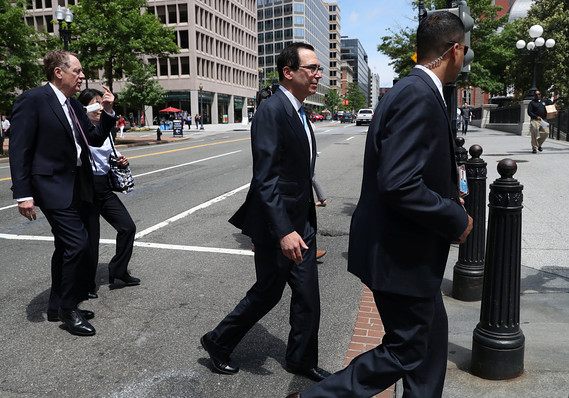 Reuters
Reuters
The move by U.S. Treasury Secretary Steven Mnuchin to designate China as a currency manipulator was done in such a way as to limit the potential fallout, analysts said Tuesday.
The designation on Monday after stock markets closed came as China didn’t prevent the U.S. dollar USDCNY, -0.2652% from rising above the key level of 7 yuan, a level it has previously defended. The U.S. Treasury under Mnuchin had resisted labelling China a currency manipulator, despite President Donald Trump’s promise on the campaign trail to do so once he entered office, and his repeated tweets criticizing China.
“Whether it worsens tensions or leads to some form of dialogue depends in part on Secretary Mnuchin, who appears to be acting tactically in the hope of preempting White House calls for even harsher measures,” said Michael Hirson, practice head for China and Northeast Asia at Eurasia Group.
He pointed out that the statement calls for working with the International Monetary Fund to eliminate any unfair competitive advantage gained by China, and the IMF is not likely to publicly heap blame on China, particularly as the country over recent months has been intervening to strengthen, not weaken, its currency. Treasury’s statement notably did not threaten other potential forms of sanction, Hirson noted.
Treasury notably designated China as a manipulator in a way that didn’t trigger an immediate response.
“The fact that the designation came under the 1988 Act, rather than the 2015 act, actually makes it a bit less disruptive, as the more recent Act is the one that automatically starts a new, specific sanction process. Nevertheless, there may be scope for the Commerce Department to treat the designation as a subsidy, which could clear the way for more and higher tariff rates on Chinese goods,” said Jim Reid of Deutsche Bank.
Esty Dwek, head of global strategy at Natixis Investment Managers’ Dynamic Solutions unit, said Treasury’s move does raise the prospect of sanctions down the line.
“There is a risk the U.S. will seek sanctions, or increase its tariffs in response, but this is unlikely to be immediate. If the currency stabilizes around or below 7, the situation could ease,” she said in a note to clients.
Trump has already threatened 10% tariffs on $300 billion of goods next month, and has imposed 25% tariffs on over $200 billion worth of Chinese products.
U.S. stock futures YM00, +1.17% were pointing to an opening bounce for the Dow Jones Industrial Average DJIA, -2.90% on Tuesday.











